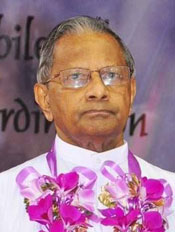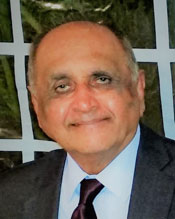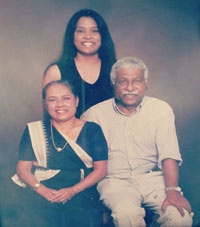APPRECIATIONS
View(s):A driving force in the development of Aquinas College
Very Rev. Dr. W.D. Gerald Chrispin Leo
 I was introduced to the genial Very Rev. Fr. Chrispin Leo in the late 1980s, as the newly appointed Rector of Aquinas Colombo 8. He nominated me to the Aquinas Alumni Association. Rev. Fr. Chrispin developed Aquinas to greater heights despite the second insurrection Sri Lanka faced in the late 1980s. He respected all faiths, races and communities equally.
I was introduced to the genial Very Rev. Fr. Chrispin Leo in the late 1980s, as the newly appointed Rector of Aquinas Colombo 8. He nominated me to the Aquinas Alumni Association. Rev. Fr. Chrispin developed Aquinas to greater heights despite the second insurrection Sri Lanka faced in the late 1980s. He respected all faiths, races and communities equally.
At my first Alumni meeting itself, it was evident to me that Fr. Chrispin was sincere to his cause and committed to achieve excellence. He joined at a time when Aquinas needed upliftment. He had already proved himself in other premier Catholic schools in Sri Lanka. He was a great motivator and highly focused. He got going expanding the faculties and facilities along with a new building at Aquinas.
Fr. Chrispin obtained degree-awarding University status for Aquinas, on the initiatives made by him and his innovative faculties of university stature. It was soon a proven success.
Fr. Chrispin was popular with the students, lecturers, support staff and past students. He helped the needy from all districts in the country. His charisma, personality and drive were unique. A perfect host and go-getter during social events, Fr Chrispin was a colossus, bringing back shades of the Aquinas Founder, Very Rev. Fr. Peter Pillai OMI.
I appealed to him to be an Advisor to His Eminence, to bring back the former glory of Aquinas. Unfortunately Fr. Chrispin passed on a few days later much to my shock and grief.
We appreciate all your assistance to Aquinas Fr. Chrispin and hope your successors will emulate your exemplary ways and high achievements. It was a rare privilege and blessing working with you and those who knew you, will remember you with gratitude at all times.
The massive crowds that thronged to pay their final respects at St Peter’s College, Aquinas Colombo and at the funeral are proof of his high acceptance.
I bow in reverence to my respected Rector. May the Good Lord grant him eternal rest.
R.P.M. Hettiarachchi
The Anthonian community will miss this ‘man for all seasons’
S.A.C.M. Zubair
 This story has its genesis in the rural hinterland of Akurana, about ten kilometres from Kandy where in 1933, Mohamed Zubair (MZ for short) was born to a deeply rooted simple couple who at the time, did not have the prescience that their son would one day blaze a trail of glory in the world of academia.
This story has its genesis in the rural hinterland of Akurana, about ten kilometres from Kandy where in 1933, Mohamed Zubair (MZ for short) was born to a deeply rooted simple couple who at the time, did not have the prescience that their son would one day blaze a trail of glory in the world of academia.
The first school he attended was Akurana Tamil School (later Central College) which had cadjan roofing and a clay floor. He passed the Grade Five Scholarship examination, enabling him to attend St. Anthony’s College in Standard 2. His English was so poor that on his first day, he could not even understand the teacher’s request to “sit down”!
Like some classical scholar, he made such rapid progress in English and the other subjects in the curriculum that he won the General Proficiency Prize in Standard 4. He was the ‘Golden Boy’ of his class and the favourite of his teachers.
In 1946, MZ was promoted to Form 1 in the Upper School and was introduced to esoteric subjects like Algebra, Geography, and Latin. He breezed through them all and in 1947, found himself under the charismatic tutelage of the Principal, Reverend Father Angelo Rosati, who took the Algebra and Geometry classes. Like a classy batsman at the wicket hitting the ball to all parts of the field, MZ made it to the SSC Class (present Day ‘O’ Level) and scored a brilliant century in his educational innings with a First Class pass. Apart from his studies, he was a ‘King’s Scout’. The prizes he won each year included those for the Senior English Essay, Senior Physics, Mathematics, and the medal for Tamil Oratory.
In his last two years at St. Anthony’s he was a College Prefect, and when he sat the University Entrance examination, he succeeded with flying colours and obtained entry to the University of Ceylon in the Engineering Faculty – one of just 24 students from the whole country to merit selection. He left college in 1954.
After graduation, he joined the Department of Electrical Undertakings (now Ceylon Electricity Board) as an Engineer, serving in many divisions. His forte was power line communications, and having trained in Switzerland, he became the Chief Engineer of that section. Thereafter, foreign lands beckoned, and in December 1974, he accepted an overseas assignment in Malawi. On his return, he founded his own company, Power Cast (Pvt) Ltd., to design and manufacture pre-stressed concrete poles. The company became a serious competitor to the State Engineering Corporation, the main supplier of this product to the Ceylon Electricity Board.
Following this, he was appointed Chairman of LECO and later in February 2003, Chairman of the Ceylon Electricity Board, a position which he held until February 2005. He also served as Chairman of Lanka Transformers (Pvt) Ltd. He rendered yeoman service to the electrical engineering community as the Chairman of two premier engineering institutions – the Institution of Engineers Sri Lanka (IESL), and the Institution of Engineering and Technology (IET). Among his many duties, he was also the President of the Muslim Ladies Arabic College.
He never sought these positions. Instead, one could say the opposite was true because these positions were offered to him purely on merit, totally devoid of any political patronage. Humble in the extreme, MZ was a mild-mannered man of unassuming character with a trademark smile, and his excellent command of all three languages endeared him to many.
As a student and during his working life, he rallied round the banner of his alma mater by upholding the values, standards and ethics of St. Anthony’s College, instilled in him as a schoolboy. In fact MZ was similar to the main character in Robert’s Blake’s poem, the “Man for all Seasons” where the hero Sir Thomas Moore stayed true to his conscience at any cost, even when his life was threatened by King Henry the Eighth. Whatever adversity MZ may have faced, he held on to his dreams, and realised his ambitions.
Sadly all things in life are fleeting and Mohamed Zubair was called to his eternal reward on August 11, in London. The news sent waves of sadness to his myriad friends and acquaintances around the world. To his family, the Anthonian community extend our very deepest sympathies. As we conclude, we fancy hearing his voice from another dimension telling us:
“Farewell my friends
It was beautiful as long as it lasted…
The Journey of my Life”.
To which we old Anthonians in deep respect and love respond:
“Our joys will be greater
Our love will be deeper
Our lives will be fuller
Because we shared your moment.”
Bernard Van Cuylenburg and Sisira Weragoda
Remembering a brilliant mind in elephant research
Charles Santiapillai

Charles with his wife Anoma and daughter Shyama
It is with profound gratitude that I pen these words of appreciation on the eighth death anniversary of a dedicated professor, wildlife conservationist, eminent zoologist, world respected elephant expert and also a loving father, Charles Santiapillai.
Professor Charles Santiapillai was born on May 12, 1944 in Jaffna to a humble Christian family and passed away on October 29, 2014 at the age of 70. He attended St. Patrick’s College Jaffna and was an outstanding student. He was selected to the University of Peradeniya in 1965 where he obtained a B.Sc. Honours degree in zoology and based on his excellent performance was recruited as an Assistant Lecturer at the Department of Zoology, University of Peradeniya. He obtained his doctorate in Zoology in 1975 from the University of Southampton, England. He also served as a senior scientific officer for the WWF (World Wildlife Fund) based in Indonesia from 1984 to1992.
He retired from the University of Peradeniya in 2009. After retirement, he worked closely with the Department of Wildlife Conservation (DWC) to support various wildlife conservation and research projects initiated by the DWC. One of the key projects conducted under his guidance was the first national survey of elephants in Sri Lanka in 2011. It was during this time that I became closely acquainted with this eminent personality as he used to visit our Kurunegala residence because my father, Sarath Dissanayake (retired Deputy Director of the Department of Wildlife Conservation) as the Deputy Director in charge of the Training and Research branch of DWC at that time (2011/2012) had the opportunity to work with him on numerous occasions. My father also feels privileged to have been one of his students at Peradeniya University in 1976/1977.
Professor Santiapillai rendered an immense service towards wildlife research in Asia particularly on elephants. On November 14, 2005, the President awarded him the prestigious national award of Vidya Nidhi (“A Mine of Science”) in recognition of his research and service towards wildlife conservation, the highest national honour a scientist can receive in this country.
Professor Charles authored numerous research papers that were very popular among the scientific community all over the world. When he came to meet my father to discuss matters pertaining to wildlife projects, I took the opportunity to clarify my doubts related to English grammar. I used to ask him many questions and he was always so helpful and never refused to correct my mistakes.
We are sad to have lost this world renowned conservation biologist, ecologist, outstanding educator and inspirational person who prioritised his professional career over his personal life. He never sought material assets and prominence but gave priority to his duty and social welfare.
Dear Sir, your life was a blessing to the whole country.
Navoda Dissanayake
My mother Ena
Anula Kusum Aluwihare Jayasuriya remembers her mother on her 100th birth anniversary

Three generations: The writer (left) with Eva (centre) and Shani
Ena wore many hats, had myriad talents and was known by numerous appellations. Ammie to me, Eno to my father, Buddy to her sister, Phyllis, Loku Ammie to my maternal cousins, Nanda to my paternal relatives, Aunty to the batik artisans (Ena’s “girls”) in Aluwihare, Missis to the artisans in Colombo, Aunt to her vast circle of younger friends, and Walauwe hamuduruvo to the domestic staff. Ena loved being loved and relished belonging to the people she chose as her tribe. Ena was also uniquely Aththama to her beloved granddaughter, Shanika, whom she called her little Mango, her Koochiboo.
I was an inconvenient surprise to my mother: having had my brother, Anil, 13 years prior, she assumed that her child rearing years were behind her. Ena and I were also very different. To her utter disappointment, I could neither sing nor dance, I was stilted in my style – dreading the Parisian A-line dresses and Kandyan lama saris Ena had tailored for me – and all the while yearning to conform by wearing frilly dresses like everyone else. My artistic imagination was derivative and limited, and most disappointing of all, I did not look like her. Ours was thus a fraught relationship – one that was unexpectedly transformed by the birth of my daughter, Shanika, in 1992.
Much to my astonishment, increasing admiration, and delight, Ena became a devoted and doting grandmother. When Shani was a baby Ena would spend the entire day taking care of her, doing things that she would never have done with her own children: feeding, changing nappies, bathing, reading, singing, and painstakingly logging in a notebook Shani’s every quotidian activity including bowel movements. When I came home, she would proudly report the detailed course of Shani’s day.
As Shani grew older, Ena would spend hours playing with her, crawling on all fours as an elephant while Shani sat on her back playing mahout, prodding Ena with a stick. They also played “Royal Palace”, a game in which Shani would be the Queen and Ena the serf: Shani would give orders and Ena would obey. Ena would teach Shani Pal Kavi (harvest songs), smatterings of Sinhalese, and select poetry – Edward Lear, Ogden Nash and Robert Frost were some of their favourites. They would also dress up in flamboyant clothing and gallivant around the house making lots of noise. They would draw, paint, write poems and stories, and do messy crafts – all the while engaged in robust discussions on colour choice, story line and artistic merit.
They frequently disagreed and squabbled, but amicably and with obvious affection. They would go on long strolls in our neighbourhood looking at every flower and plant, feed our stale bread to the ducks at the local pond, document various migrating birds, and mimic bird songs. The last stop was usually the Los Altos public library where they would borrow bags full of books. Theirs was a unique and deeply loving bond, grounded in mutual love, admiration, and inspiration. And I sat on the sidelines: watching, enraptured. An entirely different Ena emerged, flourished, and slowly replaced the memory of the problematic mother of my youth.
Ena was the best grandmother I could ever have imagined. She reached into her boundless store of talents to entertain, teach, and expand Shani’s horizons across many dimensions. Ena imbued in her granddaughter a strong sense for Shani’s Sri Lankan ancestry and reinforced her sense of belonging to her Sri Lankan family. Among Ena’s panoply of remarkable achievements, awards, honours, and accolades, in my eyes, this is her greatest feat, and the one for which I shall forever be grateful.
Searching for an ideal partner? Find your soul mate on Hitad.lk, Sri Lanka's favourite marriage proposals page. With Hitad.lk matrimonial advertisements you have access to thousands of ads from potential suitors who are looking for someone just like you.


